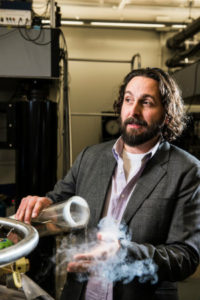
PROF. JOHN P. DAVIS – jdavis@ualberta.ca
is a Professor in the Physics Department at the University of Alberta, a NINT Fellow, an Alberta Innovates Strategic Chair, an Alfred P. Sloan Research Fellow, a 2016 NSERC Discovery Accelerator Supplement awardee, the 2016 Petro-Canada Young Innovator, and was a member of the former CIFAR Nanoelectronics Program. He has graduated four MSc students, and has a current group of eight graduate students.
Prof. Davis’ teaching honors include the 2014 Provost’s Award for Early Achievement of Excellence in Undergraduate Teaching and the 2012 Teaching Excellence Appreciation Award from Delta Chi.
He is committed to developing quantum nanotechnology, specifically quantum transducers and sensors. His lab houses the most advanced system in the world for measuring on-chip nanophotonic and optomechanical devices at millikelvin temperatures, and recently has demonstrated near ground-state cooling of nanomechanical devices.
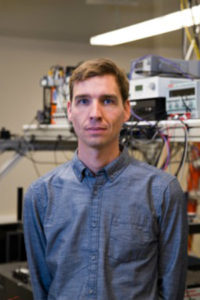
PROF. PAUL BARCLAY – pbarclay@ucalgary.ca
is an Associate Professor of Physics at the University of Calgary, a 2016 NSERC Discovery Accelerator Supplement awardee, and the Alberta Innovates Scholar in Quantum Nanotechnology.
He is a world leader in developing quantum optical devices from a wide range of materials. Important contributions include the first measurement of nonlinear effects in silicon nanocavities, development of widely-adopted fiber probing methods for sub-wavelength nanophotonic devices, and demonstration of some of the first diamond nanophotonic devices for quantum optics and optomechanics.
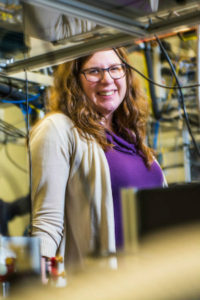
PROF. LINDSAY J. LEBLANC – ljleblan@ualberta.ca
is an Associate Professor in the Physics Department at the University of Alberta. She is currently the CRC Tier II for Quantum Simulations with Ultracold Atoms, a Fellow of the CIFAR Program in Quantum Materials, and the Alberta Innovates Strategic Chair for Hybrid Quantum Systems.
She is an expert in ultracold atomic systems, including nanofabricated atom-chip technologies. She and her team bring expertise in precision laser systems, ultrahigh vacuum, custom low-noise electronics, and numerical modelling of many-body quantum systems.
Currently, one of her areas of focus is in hybrid quantum systems, where she has a unique system designed for bringing ultracold atoms and solid state nano-devices in close proximity.
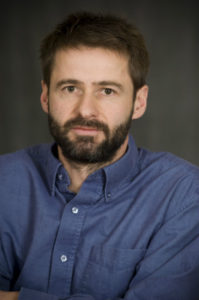
PROF. RAY DECORBY – rdecorby@ualberta.ca
is a Professor of Electrical & Computer Engineering at the University of Alberta. He has supervised 20 graduate students to completion, with many subsequently employed in the Alberta high-tech sector.
He brings extensive expertise in integrated optics, and has been granted two recent patents for his work on novel fabrication processes. His expertise includes the design, fabrication, and characterization of micro- and nano-scale devices such as optical cavities and waveguides, which have been identified as key enabling components for many quantum technology platforms.
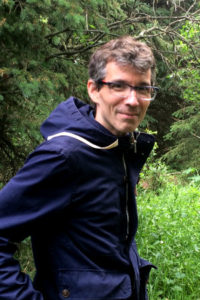
PROF. CHRISTOPH SIMON – csimo@ucalgary.ca
is a Professor of Physics at the University of Calgary. He was awarded the 2010 Alberta Innovates New Faculty Award, the 2014 UofC Faculty of Science Research Excellence Award, a 2015 NSERC Discovery Accelerator Supplement, and was a 2014 and 2016 Graduate Students’ Association Supervisory Excellence Award Nominee.
He has made significant contributions in the areas of long-distance quantum communication (entanglement creation, quantum repeaters, entanglement purification, quantum memories) and of trying to bring quantum physics to the macroscopic level (quantum optomechanics, quantum amplification).
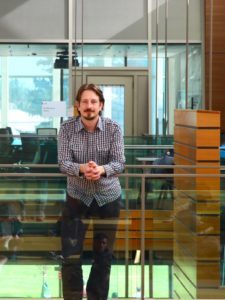
PROF. DANIEL OBLAK – doblak@ucalgary.ca
is an Assistant Professor of Physics at the University of Calgary. He completed his Master’s degree in physics and mathematics from Aarhus University with his thesis work on quantum non-demolition measurements of laser-cooled Caesium atoms. This research would continue into his Ph.D. and eventually lead to the demonstration of spin- squeezing on the atomic clock-transition. Following his Ph.D. Daniel was awarded a two-year Carlsberg Foundation Postdoctoral Fellowship and joined the Quantum Cryptography and Communication (QC2) labs of Prof. Wolfgang Tittel at the University of Calgary. Daniel now leads the Quantum Cloud Lab in Calgary, where his team develops the experimental capabilities that will lead to practical implementations of quantum links forming the basis of quantum networks that connect distant quantum devices. The goal involves research into quantum-key distribution over fibre and free-space channels, non-classical light sources, quantum memory and more.
